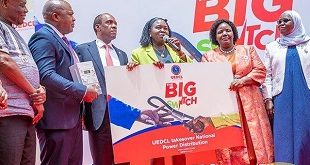
OPINION: Why it was morally right to reward public officials for winning Shs1.6 trillion worth of government revenues
By Andrew M. Mwenda
“It is not easy to stand apart from mass hysteria, to argue against something that everyone, especially the most respected political leaders, academics, and experts are saying and instead argue that they are mistaken or deluded.” Leo Tolstoy, 1897.
Ugandans are angry, extremely angry, that their government paid out Shs3.58 billion as a cash bonus to public officials who helped our country to win $434m (Shs1.6 trillion) in Capital Gains Tax from two international oil companies. I find it strange that our people are angry with the government for rewarding exemplary performance. This is especially intriguing because Shs3.58 billion is less that 0.2% of the money that was won. In fact the arbitrator awarded Uganda costs of $4 million (Shs14.5 billion) and the bonus is only 25% of these costs. Why then is there a hue and cry?
Recently, Stanbic Bank Uganda announced that it would pay a bonus of Shs1 billion to its Managing Director, Patrick Mwehire, for exemplary performance in 2016. They made an unprecedented Shs200 billion in profits during a period when many banks in Uganda are struggling. This is 0.5% of their profits. There is a need for government to borrow some lessons from the private sector to improve public sector performance. This is one of such lesson.
Every decision we make has an opportunity cost i.e. the value of the second best alternative forgone when we make a choice. We think, and correctly so, that our public officials are very corrupt. Therefore, we should have expected Ugandan officials working on this oil tax dispute to do what all corrupt public officials do i.e. negotiate for private benefits at the expense of the common good.
For example they could have asked for a bribe of $2m (Shs7.2 billion) each and let the oil company win. The oil company would have paid $84m (Shs302 billion) worth in bribes but saved itself $360m (Shs1.3 trillion). This choice was open to our public officials. But they did not pursue their pecuniary interest but the national interest. Such exemplary display of the public spirit, which is rare among our public officials today, should be rewarded.
Uganda’s success on this matter is even the more inspiring because there is not a single country in postcolonial Africa that has ever won a Capital Gains Tax dispute against these multi-national oil companies.
I am reliably informed that since Uganda’s success other oil producing nations of Africa have had to amend their laws to follow our example. This achievement was unprecedented and rewarding public officials who did it with less than 0.2% of the proceeds was the morally right and fair thing to do.
There may have been problems on the criteria used to choose who to benefit and whom to exclude. But that is a debate on the procedure, not the substance of the bonus. I am willing to listen to that.
 The Independent Uganda: You get the Truth we Pay the Price
The Independent Uganda: You get the Truth we Pay the Price




Why was Parliament not consulted before the payment was made? Who authorised the payment? Why was is classified as a payment to non-teaching staff? Was the quoted payment to Mweheire not part of an agreed-upon contract, was it not approved by the BOD, is Stanbic not financing it’s budget 100% unlike Uganda Ltd who are surviving on donor handouts? Why was the rank and file not considered? By virtue of what most of the beneficiaries earn on a monthly basis ($10,000+), are they not expected to pull of such stunts and more on behalf of an impoverished country that we are. The anger stems from how the transaction was reached at and concluded without following due process as it amounts to theft of public funds by those who hold the keys to the vault.
1.MP’s just feel its not a moment to lose especially regarding the presidential handshake this is just a case of most Ugandans having socially no account but just a bother to govt.
2.This case was a gamble(its like having unprotected sex in this era of HIV) coz there was precedent in most legal cases were companies Vs Govts lost in oil litigation and abriatation cases.We should also bear in mind that most oil companies are owned by mafias.
3. What if we had lost the case would we have blamed URA for ignoring legal advise coz most Ug lawyers had advised that it was a bad case?
4.This case has exposed how greedy CEO ‘s in Ug/Africa have become:(i)Is the CEO of URA a technical expert in Tax matters? if no was it necessary for her to be in London?(ii)Most CEOs are good at attending conferences abroad even when its meant for junior staff they do this just to earn .(iii)Personally i think only a team of 5 would have represented govt in the oil case in London dont be surprised that the Law firm that represented us comprised of only 3 guys.
5. Last year i was at Safari Park Hotel in Nairobi it was hot and i wanted to swim but later noticed that there were were so many Ugandans in the vicinity i noted Charles Obbo,David Mpanga, Jimmy Kiberu were attending a wedding only to inquire i was told it was a wedding of Ugandans so i kept wondering why would someone wed from Kenya yet they are Ugandans i was told that Charles Okwir fears the govt coz he has been its critic while in London please add him to the TVO squad.
Re: Anger among Ugandans has nothing to do with President Y.K. Museveni; it has everything to do with expectations out of the Oil
It is symptomatic, it is historical, it is cumulative and has been undiagnosed since 1962. The fuel is: internal unrest between 1966-1971, the debauched war to topple Amin, the international embargo against Uganda during Amin’s regime, the devaluation of the Uganda shilling with promise to compensate people that was not fulfilled, the 1979 war, the 1983 Bush war, the promises to compensate those who lost property in the wars which were fulfilled for some and not others and the impact of HIV.
My late grandfather served as one of the first chiropractor-medical assistant in various places in Uganda including Mbarara and Masaka. He retired in the 60’s. His children were educated in various schools. My father won an Engineering scholarship which took him first to Britain, Italy, Germany and then Brazil. In Britain, he excelled at the Guy-Leyland Industry, in Italy he beat the computer at assembling a Fiat engine. He helped improve circulation and reuse of oil in diesel engines. He was enticed to remain in Europe but chose to come back to Uganda. The Amin regime did not agree well with his types. He was unceremoniously asked to leave his job as the Government Vehicle Inspector. No compensation was made. He was forced to start afresh. I am sure there are many stories like these in Uganda.
I can pointedly say more anger among Ugandans was furiously and fiercely stalked or reignited by the occurrences between 1979-1986. HIV brought its strain of anger. This anger has never been fully assuaged. The early collective mind of a Ugandan black African in the early days of the HIV disease took on a multi-faceted dimension. In the earlier days (early 1980’s) following the 1979 Liberation war many things happened simultaneously.
A regime change that ushered in the road to democratic governance. People who committed atrocities were brought to trial. Others were not. Some who lost property, were compensated but others were not. There were rumours of a disease far away from Kampala City Authority’s comfortable zones. Othering those who had the disease became the norm. A vacuum and disconnect between those who were to provide services and recipients opened up. 5 litre jerry cans of herbal medicines that cost a limb became the symbols of self care in many a homes. It was a field day for unregulated herbalists. My own father sold all his 6 Bunga-Ggaba estate mansions plus the sprawling well manicured 8 acre land attached as he fought for his and the life of the wives. An insurance supported by government would have helped but, it was non existent. Today, the case of access to ARV’s warrants an entire article on its own.
Meanwhile, it is still open market for the herbalist and other providers who promised cures which are not real.
Between 1979-1986, Uganda experienced tensions at political, social and cultural levels which in turn affected the way people experienced life and decided on what to prioritise. A mass austerity automatically kicked in even without the government’s say so. People made austerity practices that affected food provision, sleeping arrangement, mobility, choices for wellness and investing in quality life. People became a dumping ground for trauma characterized by severe deprivation and living in squalid conditions. This has gone on even after it has been established that Uganda has one of the best government systems in Africa today. Somehow, this trauma has demotivated many from taking initiative. Not even “entandikwa,” “ennyongeza” “bonna baggagawale,” and other programmes can be carrot or stick enough. But, this does not give Uganda any excuse not to provide ways to addressing many unmet past recession, depression and austerity episodes. Another article will explain the meaning of President Y.K. Museveni’s remark: “…I am not any body’s servant. Me, I am a freedom fighter….” But quickly and as a scholar of intercultural communication. This message was not meant to posture or position himself as an isolationist. In fact, he was a proud elder about to surprise a clan with a bull roasting feast. It was a preamble! But, let me not digress. We were talking about Uganda’s need to adorn the mantle of a true welfare state now that she has Oil.
Other countries went through periods of recession, depression and austerity because of war, cataclysm or government policy. Ireland, Germany, U.S. (What was ‘The Great Recession’) and many African countries come to mind. Austerity with hope in a government that will come around to address historical wrongs in all the spheres at political, community and household level is galvanizing. The U.S. has gone through periods of austerity and two come to mind: The Depression, the 2008 recession and the 2013 government shutdown did not stop the The U.S. social systems to provide a minimum redress. This gives people hope.
Hopefully Uganda which has gone through traumatizing events can use say, Oil, to heal wounds and provide spaces of hope for diverse communities. It will be possible to help many who may privately be grieving not only for HIV but loss of property due to wars. This grief followed the 1979 war, the “war in the bush” and HIV/AIDS.